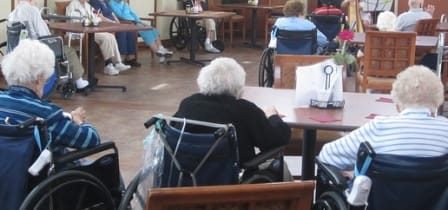 Many people mistakenly think that Medicare will pay for nursing home care for their elderly parents or loved ones. Unfortunately, except under limited circumstances, they are mistaken and that mistake can be a costly one. Families of elders should seek advice when facing long-term care issues.
Many people mistakenly think that Medicare will pay for nursing home care for their elderly parents or loved ones. Unfortunately, except under limited circumstances, they are mistaken and that mistake can be a costly one. Families of elders should seek advice when facing long-term care issues.
 Medicare Part A (Hospital Insurance) may cover care in a skilled nursing facility (SNF) if it is medically necessary for the person to have skilled nursing care (like changing sterile dressings). However, most nursing home care is custodial care, like help with bathing or dressing. Medicare does not cover custodial care if that’s the only care the person needs.
Medicare Part A (Hospital Insurance) may cover care in a skilled nursing facility (SNF) if it is medically necessary for the person to have skilled nursing care (like changing sterile dressings). However, most nursing home care is custodial care, like help with bathing or dressing. Medicare does not cover custodial care if that’s the only care the person needs.
Even when Medicare covers nursing home care as being medically necessary, it only covers up to 100 days of care in the SNF after a person has spent three days in the hospital and as long as the person needs skilled care. If a person no longer needs skilled nursing care, even though they may not be able to return home because they cannot care for themselves, Medicare will not continue to pay for the nursing home care. And Medicare will only pay for care in a Medicare-certified skilled nursing facility or through a Medicare-certified home health or hospice agency. Medicare does not pay for care in a continuing care retirement community (CCRC) or in an assisted living facility (ALF).
An example helps explain the different scenarios. Tom and Joan have an elderly mother, Sally, who has a myriad of age-related ailments, including dementia, severe arthritis, and diabetes. With help from Tom and Joan and a part time caretaker, Sally is still living at home. Then Sally has a stroke. She’s taken to the local ER and is admitted to the hospital to receive treatment. After a week in the hospital, Sally has stabilized to the extent that she can be discharged from the hospital but she still needs to undergo several weeks of physical therapy (PT) to help her cope with paralysis on her left side. Sally is discharged from the hospital and is taken to a skilled nursing facility where she can receive the skilled care she needs. Up to this point, Sally’s care would likely be covered by Medicare.
After three weeks of PT in the nursing home, Sally has regained some of her strength but she is still suffering from some paralysis to her left leg. She is not continuing any improvement from the PT–her improvement has reached a plateau. Despite her improvement, Sally is unable to resume living on her own at home. She needs help with activities of daily living such as bathing, grooming, using the bathroom, etc. As a result, Sally needs to be in an ALF or a nursing home. Sadly, Medicare will not pay for this type of care because it is custodial rather than skilled.
If a person has a chronic illness or disability and needs extensive long-term supportive services, they will need to find resources other than Medicare to help pay for these services. There are governmental resources out there–including the Medicaid ICP program and the VA’s Aid and Attendance program. However, both of these programs require that the person meet certain criteria in order to qualify. This is where an experienced elder law attorney can help.

